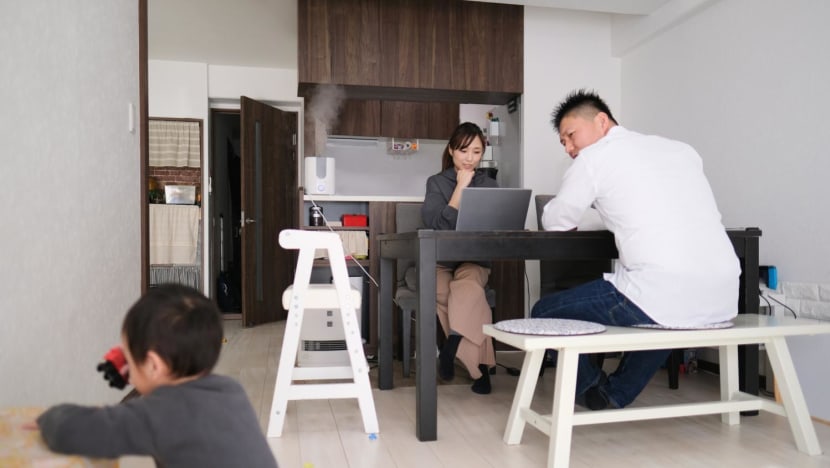Commentary: What I got wrong about remote work - our life outside work
Working from home offers more flexibility, which should make it easier to see our friends. That largely hasn’t happened, says Sarah Green Carmichael for Bloomberg Opinion.


This audio is generated by an AI tool.
BOSTON: The end of one year and the start of another is always a good time to admit one’s mistakes. And I got something wrong - really wrong - about remote work.
In 2020, when offices shuttered and many knowledge workers began routinely clocking in from home, many sceptics decried the arrangement’s loneliness and isolation. This, I argued, was short-sighted - because although remote workers might be alone much of the day, it’s perfectly possible (in normal, non-pandemic times) to have a social life outside of work.
But after nearly three full years of remote and hybrid arrangements, the evidence is in: Most people working from home are seeing less of their friends than before COVID-19.
MORE TIME ALONE OR WITH FAMILY
This surprised me. I thought that when pandemic-era isolation ended, remote employees would use the time saved on commuting to reinvest in their non-work relationships. Without a long commute, it would be easier to invite friends over for a home-cooked meal. Increased flexibility would allow for more mid-day walk-and-talks and coffee dates.
To borrow an economic metaphor, I didn’t think remote work would shrink the pie of camaraderie; personal friendships would just steal some market share from professional connections.
Work It podcast: What's it like to work 100% remote?

This hasn’t come to pass. Multiple studies have looked at how remote workers have reallocated their commute time.
For the most part, they just start work earlier and finish later. They also spend more time sleeping, cooking, doing chores and exercising. Parents spend more time caring for children.
And although remote workers do gain more leisure time, only workers younger than 30 actually use it to get out of the house and hang out with friends. Those of us older than 30? We’re spending more time relaxing at home - either alone or with our families.
EVEN INTROVERTS FEEL BETTER AFTER SHORT CHATS
It’s alarming that mid- and late-career remote workers are spending markedly less time socialising. Adults weren’t exactly getting in a lot of quality time before the pandemic.
Political scientist Robert Putnam chronicled the decline in civic and social connections in his 2001 book Bowling Alone. US Surgeon General Vivek Murthy has been warning of a “loneliness epidemic” since at least 2017, when he wrote that “loneliness and weak social connections are associated with a reduction in lifespan similar to that caused by smoking 15 cigarettes a day.”
In The Good Life: Lessons From The World’s Longest Scientific Study Of Happiness, by psychiatrist Robert Waldinger and psychologist Marc Schulz, the authors share results from the decades-long Harvard Study Of Adult Development. The overwhelming finding: The biggest factor in life satisfaction is our relationships with other people.
Friendships are a basic human need, up there with sleep, food and exercise. And when I interviewed Schulz earlier this year, he emphasised that for a lot of people, work can be a pretty good source of friends.
That’s one reason retirees often report more feelings of loneliness. In-person work provides forced social interaction.
Of course, that’s exactly why so many people prefer to work remotely; hard pass on the awkward office small talk!
But even though many of us think we dread meaningless prattle, there have been a number of studies showing that short conversations with total strangers boost mood. Even introverts feel better after chatting with a barista, a bus driver or a receptionist.
A natter with colleagues improves collaboration. Remote workers miss out on those conversations.
RETURN TO OFFICE STILL ISN’T THE ANSWER
That’s not to say that the answer is to return to the office for 40 hours each week. For one thing, the nature of work has shifted, such that even if you’re sitting near some co-workers, you’re more likely to be communicating electronically than in person.
For another, returning to the office may not actually put us closer to our colleagues: 31 per cent of people now report to a boss in a different city, about a 10-percentage-point jump since before the pandemic. These are called "distributed teams", but such teams generally aren’t evenly dispersed; some people are clumped together in one office, with the rest elsewhere. The share of employees who work “elsewhere” has been rising.
Those are among the reasons that even if remote work entails some trade-offs, many of us are likely to keep doing it - plus, of course, factors like long commutes and the inflexible realities of school and day care schedules.
To be sure, remote work need not be lonely. A recent study published in the Journal of Research in Personality found that we can spend long stretches in solitude - up to 75 per cent of waking hours, which is more than a standard workday - before feelings of loneliness start to rise.
And today’s remote work norms are impossible to fully tease apart from COVID-19; the pandemic itself got a lot of us over-30 folks out of the habit of socialising regardless of our work arrangements.
But the data make clear that those who work from home must begin to be much more intentional about spending time with other humans.
Simply put, remote workers over 30 need to spend more time with their friends. If you’re thinking of resolutions for 2024, that’s not a bad place to start.

















